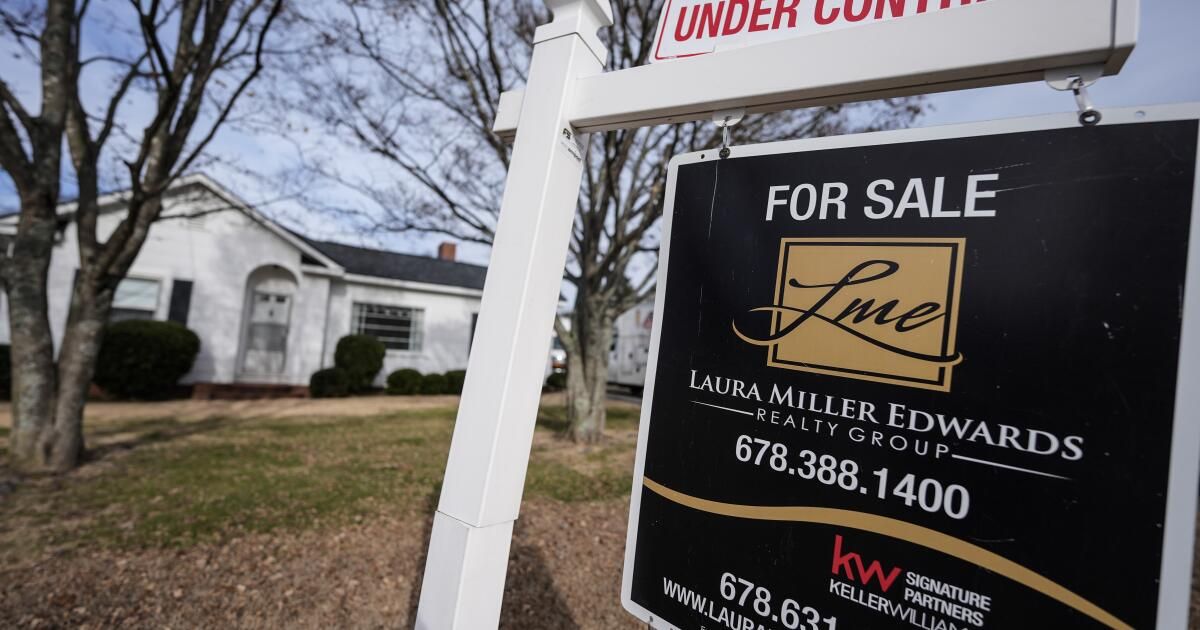For decades, if you wanted a real estate agent to help you buy or sell a home, the model was static.
At the close of escrow, the seller typically used his or her proceeds to pay a 5% to 6% commission, half of which went to his or her agent's brokerage and half to the buyer's agent's brokerage.
Now, industry rules that critics say set fees at those levels are about to change.
Developers hope the changes, which take effect on August 17, will make it easier for consumers to negotiate and put downward pressure on commissions and even home prices. But there are also concerns that buyers may have to shoulder additional upfront costs at a time when housing is extremely unaffordable for the masses.
Much is uncertain.
“I think we’re in for a bit of a wild ride,” said Tori Horowitz, a Compass real estate agent who specializes in the Hollywood Hills.
In fact, what is changing is complicated and the results are unknown.
Agents have spent countless hours talking to their brokers about the ins and outs of changes stemming from a legal settlement between the National Association of Realtors and home sellers..
Under the old system, real estate agents had to post an offer of compensation to the buyer's agent when they listed homes on NAR-affiliated multiple listing services, or MLS.
While real estate agents were allowed to offer zero dollars in compensation and real estate agents said commissions were always negotiable, several antitrust lawsuits alleged that the requirement to post an offer reduced competition and kept commission rates artificially high. In large part, this was because buyer's agents “steered” their clients to homes that offered higher commission rates, according to the lawsuits.
Andra Ghent, a finance professor at the University of Utah, recalls that when she sold homes in the past, the contracts her agents gave her to sign were already complete with a 6 percent commission, to be split with the buyer's agent.
“I was never asked if I was okay with this,” Ghent said. “That was the default.”
Buyers had even less bargaining power, finding that their own representative's payment was pre-arranged by the other party to the transaction.
In other countries, consumers pay much less, and total commissions are typically about half what they are in the United States, according to research by Norm Miller, professor emeritus of real estate at the University of San Diego.
“It is really surprising that real estate commissions [in the U.S.] “Prices have remained as high as they were in the Internet age,” said Jordan Barry, a USC professor who has studied commission rates and targeting. “It’s easier than ever for buyers and sellers to find each other.”
Things could start to change next week.
Before hiring an agent, buyers typically must sign an agreement detailing how much their broker will be paid. Sellers can later agree to cover that amount for the buyer, but sellers' agents can no longer list buyer broker compensation offers on a NAR-affiliated MLS.
The buyer's intermediaries may also not subsequently receive greater compensation than the buyer agreed to in their contract.
Proponents of the changes, including plaintiff's attorneys and consumer groups, say that by not setting the rules of the game up front, buyers and sellers will have more transparency about how their agents are paid and more power to negotiate lower commissions.
The fact that agents are forced to compete more for business could also lead to better service, said Stephen Brobeck, a senior fellow at the Consumer Federation of America.
One concern within the real estate industry, as well as outside of it, is how all of this affects buyers, particularly first-time buyers.
If sellers choose not to pay real estate agent commissions to the buyer, this could save them money. However, it may force buyers to come up with additional money to pay those commissions. If they don't have it, buyers may choose not to have representation or lose the home altogether.
“This will certainly make things more difficult for buyers,” said Mark Schlosser, a Compass agent in the Los Angeles area.
Others say buyers will ultimately benefit. That's because sellers have long paid buyers' agents in cash for the sale of their home, meaning the fee was included in the sales price and paid by the buyer through their mortgage.
By directly negotiating their own agent's compensation, buyers may find it easier to hire agents who will work for less or who can prove their service is worth the current cost.
If sellers pay less in commission, they may be willing to part with their home for less money, too. Supply could increase as homeowners find they don't need as much equity to make a profit.
“There could be, over the long term, some reduction in housing prices,” said Ted Tozer, a senior fellow at the Urban Institute think tank who previously served as chairman of the state-run mortgage corporation Ginnie Mae.
“It won’t be anything dramatic,” he said. “But if the average home in the U.S. sells for $400,000, you might be able to buy a home for $4,000 or $5,000 less.”
Increasingly, new business models could develop where agents offer a fixed fee to manage a part of a transaction (for example, visiting homes or reviewing paperwork).
Several real estate agents also told The Times that many sellers will likely agree to pay some or all of the buyer's real estate agent's commission. That's because the seller can make a bigger profit if financing the commission allows the buyer to offer more for a home than someone who pays their agent out of their own pocket.
“I’ve had several conversations with sellers and they’re totally open to it,” said Tracy Do, a Coldwell Banker Realty real estate agent specializing in Northeast Los Angeles.
There are two ways this could happen, agents said.
One: As sellers do today, they can agree to pay a certain percentage of the home's sales price to the buyer's agent; the difference is that they can't advertise the offer on the MLS.
Two: If a seller says he won't pay the buyer the broker's commission, the buyer can always write into his offer that he needs a certain amount of concessions to close the deal.
For example, a buyer might offer $850,000 for a home if the seller gives them $30,000 back, which the buyer would then use to pay their agent and other closing costs.
Tozer said it's important for buyers to understand that these options exist, so they don't feel obligated to go it alone or be represented by the seller's agent, who ultimately may not have their interests in mind.
“It’s very difficult to be objective for both of them,” he said.
The Consumer Federation of America recommends that buyers and sellers set a goal of negotiating commissions of 2% of the sales price or less for their agents and that they carefully review all contracts that agents ask them to sign, especially documents with items already completed.
On Sunday afternoon, Emmitt Hayes stood at an empty open house in Jefferson Park waiting for buyers to arrive. The real estate agent who listed the property said high interest rates have slowed the market and now some people still looking for a home have additional concerns.
“Some buyers came in yesterday and asked, ‘Do we have to pay our real estate agent a commission now?’” Hayes said.
Miller, of the University of San Diego, said he doesn't expect many immediate changes in commission rates because the real estate industry appears to be preparing to maintain the status quo.
“I haven't seen anyone advertise, either on TV, social media, in magazines or newspapers, that suggests they're going to compete on price,” Miller said.
Some agents are offering advice on how to maintain current compensation levels in the industry.
In an online video with more than 26,000 views, Baltimore real estate agent Andrew Undem told popular YouTube real estate personality Jimmy Burgess that buyer agents should tell potential clients all the steps they can help with, such as researching loan options, making an offer and navigating a complicated escrow process.
“You have to be able to articulate the buyer agency’s value proposition in a compelling way so that they’ll agree to pay you 2.5%, 3% or more than 3%,” said Undem, managing partner of SURE Group at Berkshire Hathaway HomeServices Homesale Realty.
Later, after Burgess asks Undem how he teaches agents, Undem gives an example of a hypothetical conversation with a potential client about commission rates.
“'Just so you know, we can't go below 2.5%' and then I just leave it at that and you stop talking,” he said.
“I love it!” wrote one commenter. “Every real estate agent needs this NOW!”
In an interview, Undem said agents need to be able to make their case for what they are worth and when he set a 2.5% floor that was his personal preference and he was not recommending it to others, some of whom will likely opt for a lower price.
Undem also said that 2.5% is not a hard limit for him and that he might be willing to lower it depending on the circumstances, even if a buyer needs fewer services.
Asked why 2.5%, Undem replied:
“We have become accustomed to this over the last 150 years,” he said. “I am just trying to maintain the precedent.”
Ghent, the Utah professor, said real change won't come from the new rules themselves. Instead, she argued that consumer costs would come down if publicity surrounding the changes helps Americans realize they can actually negotiate.
“If you don’t pay close attention,” Ghent said, “you could end up with the same deal as before.”












